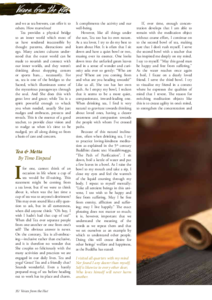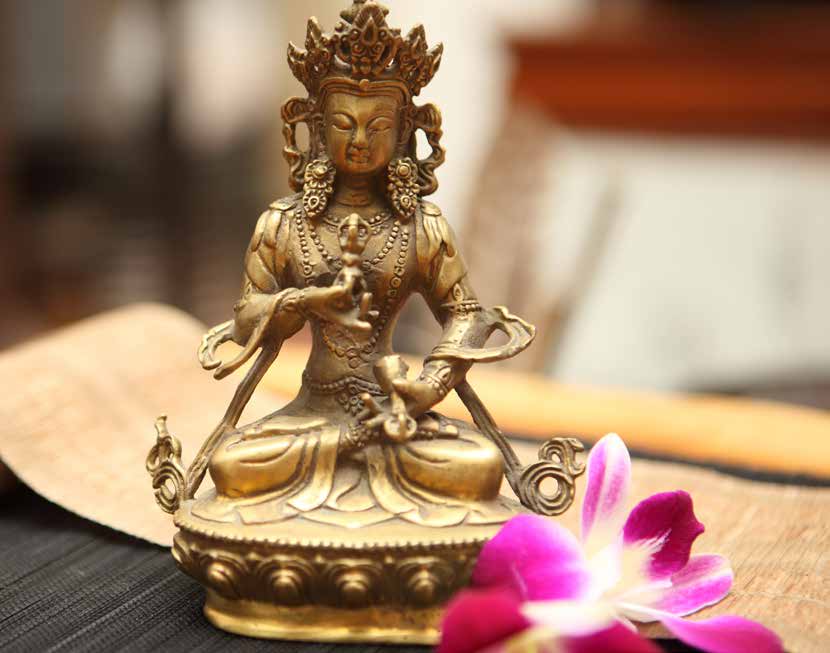
 |
|

I for one, cannot think of an occasion in life where a cup of tea would be ill-suiting. This statement might be coming from a tea lover, but if we were to think about it, when was the last time a cup of tea was to anyone's detriment? This may even sound like a silly question to ask, but in all earnestness, when did anyone think: "Oh boy, I wish I hadn't had that cup of tea?" When did Tea ever separate people from one-another or one from one's self? The obvious answer is never. On the contrary, Tea is all-embracing - inclusive rather than exclusive, and it is therefore no wonder that She couples so felicitously with the many activities and practices we are engaged in our daily lives. Tea and yoga? Great! Tea and a friendly chat? Sounds wonderful. Even a hastily prepared mug of tea before heading out to work has its place and charm. It compliments the activity and our well-being.
However, like all things under the sun, Tea too has its own nature. As a tea lover, I try to do my best to learn about Her. It is often that I sit down and have a quiet bowl or two, musing over its essence. One looks down into the unfurled green leaves and in a sense of wonder and curiosity asks ever so gently: "Who are you? Where are you coming from and what are you heading towards?" Like us all, She too has her own path. As I empty my bowl, I reckon that it seems to be a more quiet, compassionate, inward-leading one. When drinking tea, I find it very natural to gravitate towards thinking about loved ones, having a clearer awareness and compassion towards the people with whom I've crossed paths.
Because of this natural inclination, often when drinking tea, I try to practice loving-kindness meditation as explained in the 5th century Buddhist classic text Visuddhimagga, "The Path of Purification". I sit down, boil a kettle of water and put a few leaves in a bowl. As I raise the bowl to my mouth and take a sip, I close my eyes and feel the warmth of the liquid coursing through my body. I repeat to myself mentally: "Like all sentient beings in this universe, I too wish to be happy and free from suffering. May I be free from enmity, affliction and suffering; may I live happily." The exact phrasing does not matter so much; it is, however, important that we understand the meaning of the words as we repeat them and that we set ourselves as an example by which to understand other people. Doing this will create desire for other beings' welfare and happiness, as the Buddha has stated:
I visited all quarters with my mind Nor found I any dearer than myself; Self is likewise to every other dear; Who loves himself will never harm another.
If, over time, enough concentration develops that I am able to remain with the meditation object without coarse effort, I continue on to the second bowl of tea, making sure that I don't rush myself. I serve the second bowl with a teacher that has inspired me deeply on my mind. I say to myself: "May this good man be happy and free from suffering." As the water reaches once again a boil, I fixate on a dearly loved friend. I serve the third bowl. I try to visualize my friend in a context where he expresses the qualities of mind that I revere. The reason for switching meditation objects like this is to create agility in one's mind, to strengthen the concentration and to broaden the feeling of unattached love and compassion towards various forms of beings.
The fourth bowl is served to a near stranger, a neutral person. This is someone we know, but do not associate with a strong emotion. As an example this might be someone who is working at your local supermarket or a neighbor we see in the hallway on most days. We try to develop the same attitude towards him as we have towards our beloved friend. If we find it difficult and we get distracted, we switch back to our friend and after gaining our ground, try again. As I raise the fifth bowl, I think of a person with whom I have difficult relations. I try to see him with empathy and deeper understanding to his predicament. This is often the place where resentment arises. If that is the case, I return back to the previous object of meditation and try again after being well-established. Returning to him again, I try to bring out the wholesome qualities in him and concentrate on them.
This anger that you entertain Is gnawing at the very roots Of all the virtues that you guard - Who is there such a fool as you?
To wrap up, I drink the last bowl centered on each and every one of the previous objects, remaining with each as equanimously as I possibly can. This is one of the many ways that the practice of loving-kindness is described and practiced. It is considered to be a protective meditation, guarding one's mind from irritation and anger, resulting in a strong sense of calm, concentration and peacefulness which also benefits interpersonal relations. Tea offers a beautiful context for this practice, helping us to remain focused and work patiently with our own minds. I hope you will find this practice as beneficial as I have!
